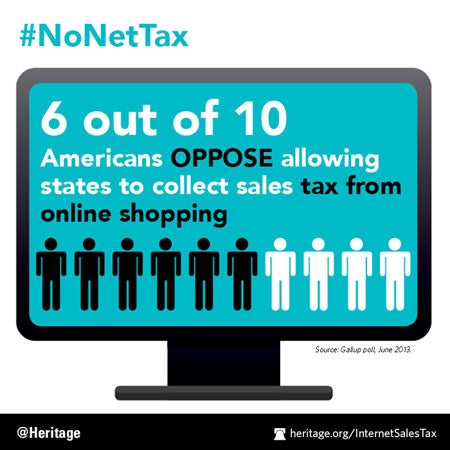Most Americans Oppose an Internet Sales Tax
Marguerite Bowling /
Imagine being forced to collect sales tax for a state government where your business has no presence or facing audits from a state that is thousands of miles from your home base. The Marketplace Fairness Act (MFA) poses these potential threats to online businesses and other remote sellers. The act requires businesses with more than $1 million in remote sales to collect sales tax from out-of-state customers and send it to the appropriate state agency.
Gallup found in a recent poll that the idea of taxing purchases on the Internet goes against public opinion. Given the chance, 57 percent of U.S. adults would vote against a law that allowed each state to collect sales tax on purchases that its residents made online.
“Unlike many political and economic issues, reaction to the idea of an Internet sales tax law does not appear to be sharply divided along party lines, either in Congress or among the general public,” the poll said, noting that young adults voiced the most widespread opposition to an Internet sales tax.
Early last week, conservative lawmakers and opponents of an Internet sales tax took to the Capitol Hill to protest the constitutional issues. The Heritage Foundation posted a video of their comments here.
“Our country was founded on the idea of no taxation without representation, and I think that this bill, the Marketplace Fairness Act, is in many ways a twenty-first century version,” said Representative Ron DeSantis (R–FL) at the Hill rally against an Internet sales tax.
“[It is the] idea of how you can impose taxes on people who can’t vote against you,” said Grover Norquist, President of Americans for Tax Reform. “The British had this going on for a while but we raised certain objections.”
Noting that most senators who voted against the MFA were under age 50, Senator Ted Cruz (R–TX) argued that lawmakers and big corporations were teaming up to make the entry barrier harder for smaller online businesses.
“What we are seeing in this bill is Washington ganging up with the giant corporations, and you’re seeing Democrats and Republicans arm and arm with giant corporations saying let’s raise $23 billion in taxes on consumers all over the country.”
Cruz and others said the MFA would hurt small businesses that sell products online, take billions of dollars out of the economy that would otherwise create jobs, and encourage state government overreach.
“The Internet has been an oasis of freedom,” said Cruz. “It has been a portal to the American dream.”
With the legislation before the House, Heritage regulatory expert James Gattuso warns in a new report that Congress should not go down the path of an Internet sales tax.
Gattuso says the legislation offers “a deceptively simple solution” to a complex problem. “While promising to level the retail tax playing field, it likely will create more uneven burdens, while bulldozing fundamental principles of federalism.”

